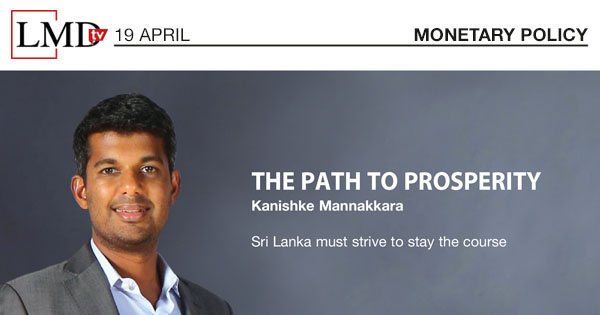The Sri Lankan economy has been on a rollercoaster ride over the past few years. Yet, according to Group Chief Operating Officer of Capital Alliance Investments Kanishke Mannakkara, the future looks positive.
On a recent edition of LMDtv, He noted how the country has seen a real shift in its balance of payments over the last nine months: “Mainly as a result of tightening monetary conditions and very high interest rates, which led to demand reductions domestically, we have seen the balance of payments turn positive.”
“And that is leading to and driving the stabilisation of the [Sri Lankan] Rupee,” he added.
Mannakkara continued: “We’ve also seen inflation come down over the last three months; we expect it to reduce to single digits and then normalise to levels that we’ve seen in the past,”
He disagrees with the three percent contraction in GDP projected by the IMF and World Bank for this year: “The huge supply side shocks in the economy – curfews, and fuel and electricity shortages – led to significant contractions in economic activity in 2022 that we are not forecasting for 2023.”
When there’s an environment where factories are able to operate and people can visit shops, “there will be growth this year versus last year,” he explained.
The Group Chief Operating Officer of Capital Alliance Investments urged businesses to be aware of changes in the landscape with developments such as a free-floating rupee. And while he noted that there would be an adverse impact in terms of difficulties in planning for where the currency will head in future, Mannakkara weighed in on the positives…
“There are a lot of positives that come with having a free float – it is an automatic safety valve when imbalances build up, and a free-floating currency allows those imbalances to settle themselves without us hitting a wall – like we did in 2021 and 2022,” he asserted.
Mannakkara is also optimistic about the enactment of the new Central Bank of Sri Lanka Act, which will pave the way for an independent monetary authority.
He elaborated: “An independent Central Bank is a positive for the country. Naturally, politicians have a vested interest in manipulating monetary policy to meet their electoral objectives – it’s human and not anything unique to Sri Lanka.”
“So the only way you can ensure that the monetary policy of a country is run for the long-term sustainable development of the economy and not for somebody’s electoral needs is by making the Central Bank independent,” he affirmed.
Mannakkara commended LMD on its Refresh Sri Lanka campaign, and discussed the need for good governance: “We’ve had a lot of large Sri Lankan corporates profiting sustainably out of bad government policies. [Unless they are] managed and reviewed on frequently, those domestic protections that worked 10 years ago end up creating monsters.”
Overall, the private sector isn’t globally competitive, he posited, adding that it should “stop looking for government support and protection, and start to focus on its own competitiveness and become more ready to play in the global market.”
Mannakkara continued: “Hopefully, we’ve had this wake-up call and all understand that good governance is critical. Many of our most successful businesses have been political but we should remain apolitical.”
“We need to be asking for things that will improve governance and transparency, and the operation of markets – so that they force us to be competitive at a global level,” he stated. Mannakkara added: “That’s when we can scale our businesses and really grow.”
In his concluding remarks, Mannakkara expressed optimism about the economy but cautioned the public against systemic instability stemming from the country’s “historic tendency to not stay the course.”
“If we’re going down this path, we need to stick to it for the next five or 10 years,” Mannakkara surmised, asserting that we need to ensure that the country “sees through some of these reforms.”




